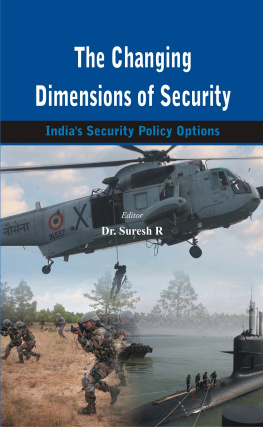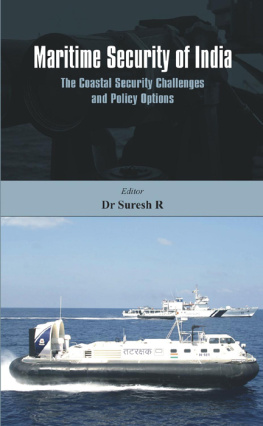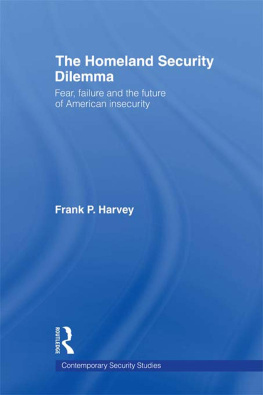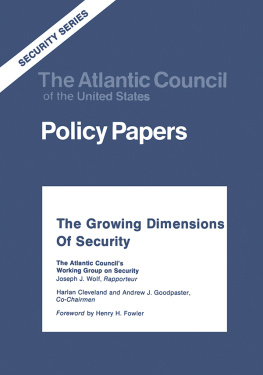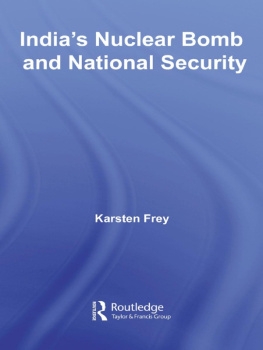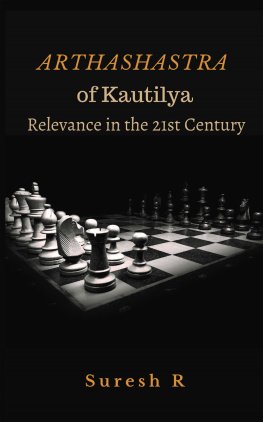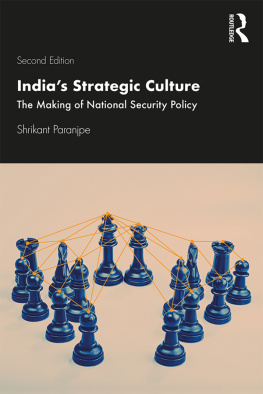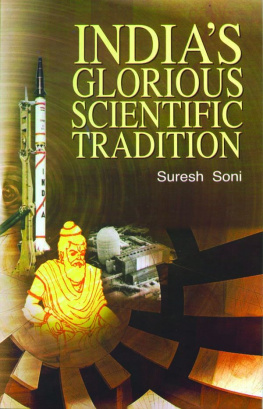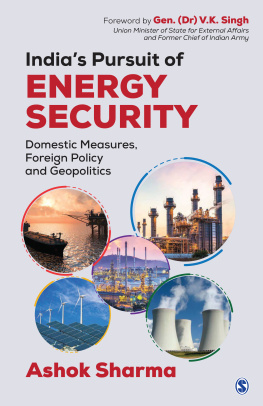The Changing Dimensions of Security:
Indias Security Policy Options The Changing Dimensions of Security:
Indias Security Policy Options Editor Dr SURESH R. Associate Professor & Hon. Director
V K Krishna Menon Study Centre for International Relations,
Department of Political Science,
University of Kerala,
Kariavattom Campus, Thiruvananthapuram,
Kerala State Vij Books India Pvt Ltd New Delhi (India) Published by Vij Books India Pvt Ltd
(Publishers, Distributors & Importers)
2/19, Ansari Road
Delhi 110 002
Phones: 91-11-43596460, 91-11-47340674
Fax: 91-11-47340674
e-mail:
web: www.vijbooks.com Copyright 2015, Suresh R. First Published : 2015 ISBN: 978-93-84464-80-6 All rights reserved. No part of this book may be reproduced, stored in a retrieval system, transmitted or utilized in any form or by any means, electronic, mechanical, photocopying, recording or otherwise, without the prior permission of the copyright owner. Application for such permission should be addressed to the publisher. The views expressed in this book are those of the contributors in their personal capacity. These do not have any official endorsement. CONTENTS PART I. The Changing Dimensions of Security
A Theoretical Perspective Professor Mohanan Bhaskaran Pillai 2. Insecurity and the Search for Security: A Biological
Perspective Dr S. Sathis Chandran 3. Examining Indias National Security Semantics:
A Theoretical Consideration Dr Nanda Kishor M S 4. Theorizing the Sino-Indian Ties in the Emerging
Global Order Dr Harish K. Thakur PART II. Indias Security Concerns in the Emerging Global
Order Professor B Vivekanandan Dr C. Vinodan Mr Rajesh Kuniyil Dr Devender Sharma & Dr Ved Prakash Sharma 9. Pakistans Afghan Policy in Post 2014 Scenario:
Options for India Dr Sudhir Singh PART III. Maritime Security of India: The Challenges
and Options 10. Challenges and Options for a Maritime India in the
21st Century Commodore R S Vasan Dr Vibhuti Singh Shekhawat 12. Emerging Maritime Threats and Challenges in Indias
Marine Domain: Post 26/11 Dr Mukund Narvekar 13. Post 26/11 Terrorist Threats in India Is National Counter
Terrorism Centre alone the Solution? Mr. Unnikrishnan G PART IV. Human Security in India: The Challenges and
Policy Options 14. Indias Security Challenges and Policy Options: A Human
Security Perspective Dr Suresh R 15. The Changing Dimensions of Security and Emerging
Nontraditional Threats in South Asia: A Human Security
Perspective Mrs. Rakhee Viswambharan Index Contributors 1. Dr. Mohanan Bhaskaran Pillai, Professor & Coordinator, UGC Special Assistance Programme Department of Politics & International Studies, Pondicherry University. 2. Dr. S. Sathis Chandran, environmentalist. 3. Dr. Nanda Kishor M S, Assistant Professor, Department of Geopolitics and International Relations, Manipal University, and Post-Doctoral Fellow (Erasmus Mundus), Leiden Institute of Area Studies, Leiden University, Netherlands. 4. Dr. Harish K. Thakur, Associate Professor, Department of Political Science, Govt. College, Sunni, Himachal Pradesh University, Shimla. 5. Professor B Vivekanandan, Former Chairman, Centre for European and American Studies, Jawaharlal Nehru University, New Delhi. 6. Dr. C. Vinodan, Assistant Professor & Chair Centre for Strategic and Security Studies, School of International Relations and Politics, Mahatma Gandhi University, Kottayam, Kerala. 7. Mr. Rajesh Kuniyil, Deputy Director, ICSSR Research Project, School of International Relations and Politics, Mahatma Gandhi University, Kottayam, Kerala. 8. Dr. Devender Sharma & Dr. Ved Prakash Sharma, Research Associates, Department of Political Science, Himachal Pradesh University, Shimla. 9. Dr. Sudhir Singh, Faculty, Department of Political Science, Dayal Singh College, University of Delhi. 10. Commodore R S Vasan, Head, Strategy and Security Studies, Center for Asia Studies, Chennai & Director, Chennai Centre of China Studies. 11. Dr. Vibhuti Singh Shekhawat, Associate Professor & Head, Department of Humanities and Social Sciences, Malaviya National Institute of Technology, Jaipur, Rajasthan. 12. Dr. Mukund Narvekar, Assistant Professor, Department of Political Science, Goa University, Goa. 13. Mr. Unnikrishnan G, Senior Research Fellow UGC, Department of Political Science, University of Kerala, Thiruvananthapuram, Kerala. 14. Dr. Suresh R, Associate Professor, Department of Political Science, University of Kerala, Thiruvananthapuram, Kerala. 15. Mrs. Rakhee Viswambharan, Assistant Professor & Head, Department of Political Science, Sree Narayana College, (University of Kerala) Chempazhanthy, Thiruvananthapuram, Kerala. With the end of the cold war, the concept of security has come under analysis from scholars of international relations and other discipline. In the classical formulation, security is about how nation states use force to manage threats to their territorial integrity, their autonomy, and their domestic political order, primarily from other nation states. This classical national security formulation has been criticized on various grounds. A nation may be secure but does not mean that all people living in that nation are secure. The social economic and political orders prevalent in that nation have an implication on the security of the people. The debates on security is centered mainly on the assumptions about what security is, what is being secured, the causes of insecurity, and how best to address insecurity. International relations theorists and policy experts have varying perspectives on these questions, which have evolved and have had changing levels of acceptance over time. Realists and neorealists emphasise the nation state as the central referent of security, both as the lens through which security is understood, as well as the tool by which security is best maintained. Liberal theorists recognize a wider set of values embedded in the concept of the state and state security, in the methods and means to address insecurity, and the actors involved. The critical constructivist scholars understand that the interests and identities of nation states are themselves constructed by the distribution of ideas and interests within the state-based system and this shapes a states security interests and how these are conceived, and in turn impacts upon the actions necessary to ensure security. Thus there are divergent views with regard to concept of security, whose security, that is whether the security of the nation or people, the causes of insecurity, and how to ensure security. The Westphalia state system had made nation states as the basic unit in the international system. And nation states are sovereign and independent. Each nation decides their internal and external policies. The prime responsibility of a nation state is to promote and protect its national interests. The national interests of nation states are mainly to ensure peace, security and prosperity within its territories. However they differ with regard to the means adopted to achieve these national interests. Some nations employ aggressive means and some peaceful methods. And foreign policy of a nation is the means to achieve their respective national interests. Therefore, though the national interests are similar nations frame divergent foreign policy, which in turn is conditioned by the interplay of internal and external factors. Thus, the foreign policy changes in accordance with the transformations in the internal and external conditions so also the security policy. | Next page

